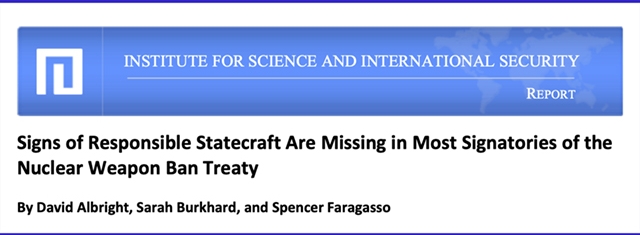News
New Report By The Institute for Science and International Security
Nuclear Weapons Ban Treaty

(Source: isis-online.org)
Institute for Science and International Security -
Peddling Peril Index
Signs of Responsible Statecraft Are Missing in Most Signatories of the Nuclear Weapon Ban Treaty
by David Albright, Sarah Burkhard, and Spencer Faragasso
April 7, 2022
Signs of Responsible Statecraft Are Missing in Most Signatories of the Nuclear Weapon Ban Treaty
by David Albright, Sarah Burkhard, and Spencer Faragasso
April 7, 2022
The Institute found a general lack of responsible state actions among the 89 countries that have signed or acceded to the Treaty on the Prohibition of Nuclear Weapons (Nuclear Weapon Ban Treaty, or TPNW) to date, compared to those countries that have abstained from signing it. This finding flows from data compiled in the Peddling Peril Index (PPI) for 2021/2022. The PPI is a measure of both the effectiveness of national strategic trade controls and adherence to widely accepted and long-standing international treaties and conventions, making it a useful indicator for responsible state actions overall in addition to its traditional role in ranking 200 countries’ and entities’ strategic trade controls. The correlation with the PPI identified a concerning lack of demonstrated commitment and implementation of international arms control, trade control, and financial practices among the current 89 signatory and accession countries of the Ban Treaty. The majority of countries (some 64 percent, or 57 out of 89) that have signed or acceded to the Ban Treaty rank in the bottom half of the PPI ranking, and 29 percent, or 26 countries, rank in the bottom quarter.
These 89 countries scored an average of 477 points in the PPI, or just over one-third of the possible points. This is below the global average for all 200 countries and entities considered in the PPI, which lies at 546 points. The Ban Treaty appears to be signed mostly by countries with little commitment to existing international norms, treaties and conventions, or to implementing strategic trade and financial controls, all fundamental international tools to stop the spread of nuclear weapons and slow the growth of nuclear arsenals.
The preamble language of the treaty may further open the door to those states seeking to undermine other countries’ strategic trade controls, an action inconsistent with the goals of U.N. Security Council Resolution 1540 (2004) mandating UN members to have national strategic trade controls, a resolution directly linked to stopping the spread of nuclear weapons.
The preamble language of the treaty may further open the door to those states seeking to undermine other countries’ strategic trade controls, an action inconsistent with the goals of U.N. Security Council Resolution 1540 (2004) mandating UN members to have national strategic trade controls, a resolution directly linked to stopping the spread of nuclear weapons.
The data show most of these countries lack adequate export control legislation to serve as a firm basis to control the trade in nuclear and nuclear-related dual-use commodities that are critical to the production and possession of nuclear weapons. If the Ban Treaty signatories truly seek a world without nuclear weapons, they should take the lead in ensuring that all countries, including their own, act responsibly, adhere to international law and long-standing non-proliferation norms and treaties, and have effective, implemented strategic trade control systems, capable of preventing the spread of dangerous and critical commodities and facilities involved in the production, maintenance, and improvement of nuclear weapons.
PDF source links:
https://isis-online.org/uploads/isis-reports/documents/UN_Ban_Treaty_Correlation_April_6_2022_Final.pdf
https://isis-online.org/uploads/isis-reports/documents/ThePeddlingPerilIndex2021_POD_wCover.pdf
PDF source links:
https://isis-online.org/uploads/isis-reports/documents/UN_Ban_Treaty_Correlation_April_6_2022_Final.pdf
https://isis-online.org/uploads/isis-reports/documents/ThePeddlingPerilIndex2021_POD_wCover.pdf
more information: https://isis-online.org/ppi/detail/responsible-statecraft-missing-in-signatories-of-nuclear-ban-treaty
Liability for this article lies with the author, who also holds the copyright. Editorial content from USPA may be quoted on other websites as long as the quote comprises no more than 5% of the entire text, is marked as such and the source is named (via hyperlink).





